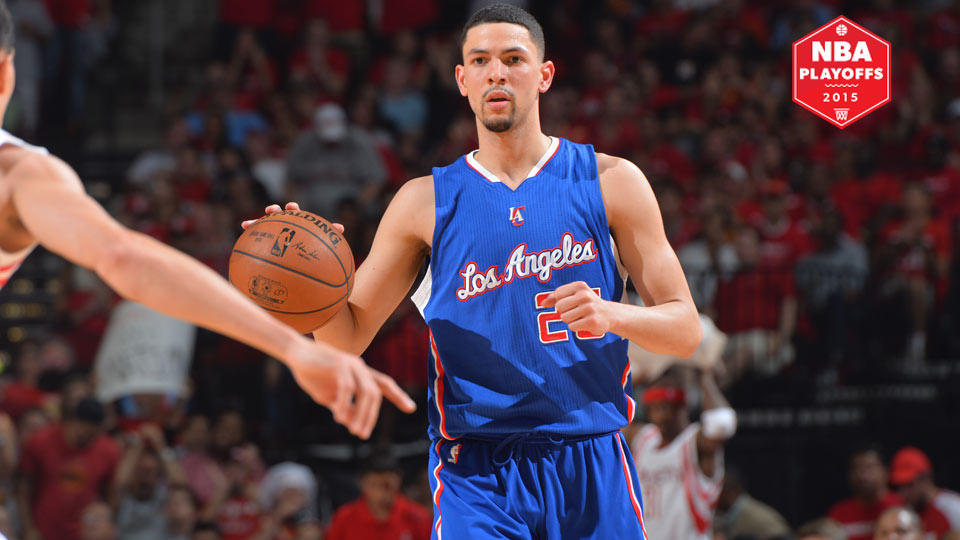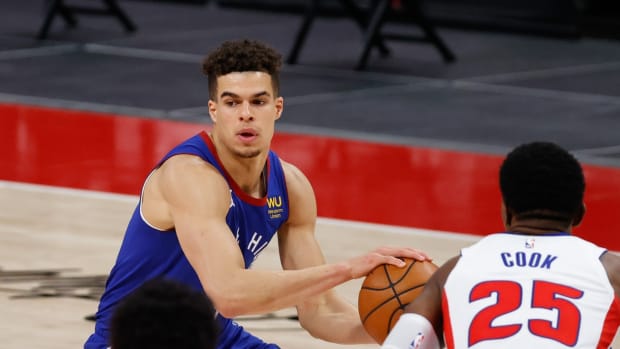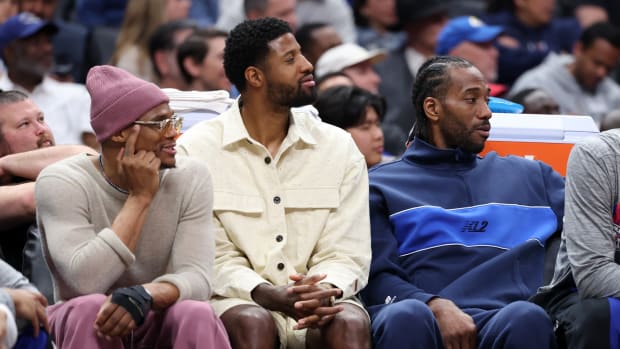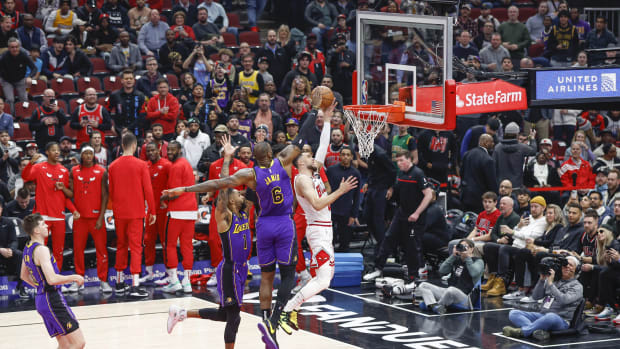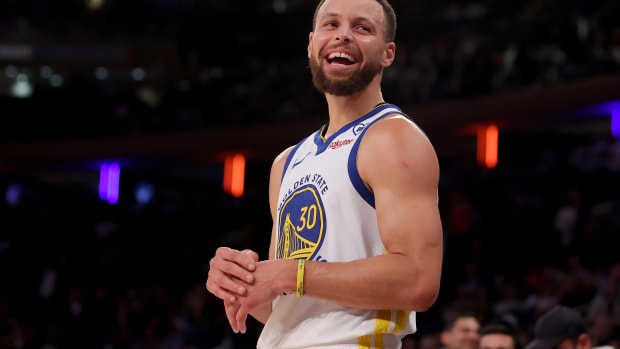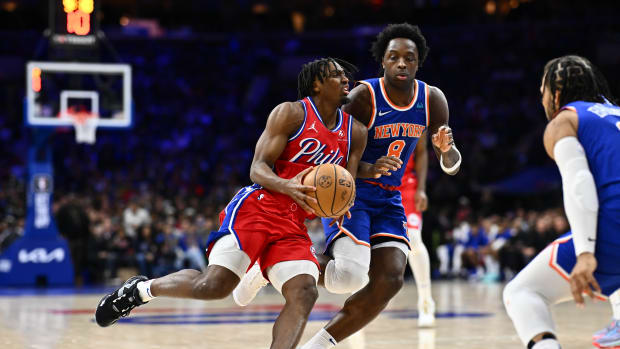Like it or not, Austin Rivers is critical to Clippers' postseason success
Defending Austin Rivers on Twitter is a brazen act of crime akin to praising Reggie Miller’s color commentary, rooting for Dwight Howard or criticizing Russell Westbrook. Complimenting the Clippers backup point guard (though calling him a point guard is disingenuous) isn’t even daring or perverse, it showcases a fundamental misunderstanding of basketball. It betrays common sense because he’s a fringeplayer. Praise for Austin Rivers is tantamount to ignorance. Laud him if you dare, but don’t prepare for a response of gentle ridicule; armor up for outright contempt.
That snarky Austin Rivers tweet may earn you a few favorites, if you’re lucky, even a trending Twitter topic! (See: Austin Rivers crosses up himself).
Rivers is the patsy we can all pillory, because only a few qualities unite hatred in the basketball democracy. We still love Carmelo Anthony's ability to score, we still gawk at Deron Williams’ ability to strains opponents’ ankle ligaments, we even like Dwight when he flushes a vicious dunk. But, boy, do we hate nepotism. Austin Rivers’ dad, Clippers coach Doc Rivers, drew praise from TNT commentator Kevin Harlan for honoring the example of his father, a hardened ex-Chicago cop. But Austin Rivers is Doc’s son. The coach’s son. His opportunity must have been given, not earned. He’s lucky, not good.
Rockets waste prime opportunity, fall to Clippers without Paul in Game 1
Here’s the problem with all of the arguments above: Austin Rivers is crucial to the Clippers' playoff success. He earned a game ball from team captain Chris Paul after his pivotal performance in Game 4 against the Spurs. His defense in Game 1 against the Rockets (primarily on star scorer James Harden) was a key reason the Clippers stole a game nobody thought they’d win. Like him or not, his contributions will partially determine the Clippers’ fate in the postseason.
Yes, Austin Rivers means that much to an NBA title contender. Challenge if you wish, vomit if you please.
We may think of him as the spoiled son of NBA royalty whose basketball talents are better served in Latvia, not Los Angeles, but here he stays, an integral part of a playoff team's delicate second unit. Having played a year at Duke and having spent his short NBA career under the microscope, Rivers has learned to tune out the hate. He audaciously yammered at the Rockets bench after hitting a crucial three-pointer in Game 1. He probably didn’t spare any chatter after the other three treys he hit, either. In all, Rivers totaled 17 points, four steals and three assists starting in place of an injured Paul in Game 1.
• MORE NBA: Schedule | Grades | Awards | Playoff coverage | Finals picks
An avowed Clipper fan who suffered through years of Michael Olowokandi and actually cheered for Cherokee Parks, I spew more criticism toward Austin Rivers than to any other Clipper by a wide margin. His turnovers are as ghastly as his ball-handling. His attempts to score off the dribble and his misplaced trash talk are unsightly. He inspired mean-spirited ridicule from his own teammate that I enjoyed before watching a few more times. Even when he “started” at point guard in place of Paul, he eventually surrendered control of the offense to Blake Griffin—a 6’10” power forward.
Blake Griffin shows off a perfect Austin Rivers impersonation
While we Vine, Periscope and Snapchat the laughable turnovers or misguided drives that Austin Rivers offers during the course of any game (trust me, there’s always one … at least), Rivers earns his minutes with his defense. He's a thick 6’4” with great lateral quickness and long arms. He might be easy to tease, but he isn't easy to score on.
Without the smaller Paul in Game 1, the Clippers relied on their longer guards—the elongated Jamal Crawford (6’5”) and Rivers—to defend Harden, the Rockets’ prolific scorer who would have earned MVP if not for the existence of Warriors star Stephen Curry. A tall, burly shooting guard himself, Harden gobbles up helpless defenders with a combination of tricky ball-handling, deceptive footwork and stunning shooting. He’s indefensible without a double-team, scoring brilliantly off the dribble and extending his shooting range to some 30 feet.
The problem is that Harden is currently overextended. With the loss of Patrick Beverley to a wrist injury, the Rockets don’t have the teeth or physicality in the backcourt to exploit smaller defenders (i.e. Paul). They also don’t have the floor general of their offense.
• PREVIEWS: Cavs-Bulls | Hawks-Wizards | Warriors-Grizz | Rockets-Clips
Instead, they rely on the perpetually polarizing Josh Smith and rangy, if one-dimensional, Trevor Ariza to space their offense. Worse, it means Harden has to run the show. For all his talents (and increased assist totals), Harden is a ball-consuming scorer. When he’s in a shooting groove, the formula works. When a long, agile defender like Austin Rivers locks him up, neither Smith nor Ariza capably fills the void because they struggle to find openings.
Sports Illustrated's 10 best stories from Stephen Curry's MVP season
Harden has shined throughout the year and is bound to amaze at least once in this series. But he was contained in Game 1, scoring just 20 points on 6-of-13 shooting, thanks to the efforts of... yes, Austin Rivers.
It was confounding that the Rockets’ offense looked most fluid under the command of Pablo Prigioni, the ball-savvy, sharp-shooting Argentine whose passing acumen offered his team the necessary spacing for easy baskets. Nobody doubts the Rockets’ prolific scoring ability, the question is if they can score in the bunches needed to overwhelm the Clippers, the NBA’s most efficient offense during the regular season.
For the Rockets to win this series, they’ll need the best Harden can give them. Austin Rivers’ minutes will diminish once Paul returns, but he’ll be a key in mitigating the player most equipped to knock the Clippers out of the playoffs.
As the Rockets players ambled down the court in the waning moments of Game 1, Rivers planted his feet behind the left corner of the three-point line and swished his fourth triple of the game to give the Clippers a 112-97 lead. He jogged back to the defensive end. The game was in hand.
Austin Rivers, the NBA’s most vilified player, is a crucial cog in the Clippers’ quest for an NBA title. Whether you like it or not.






























